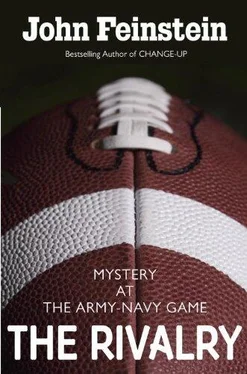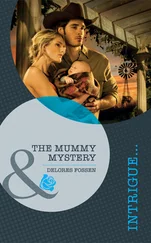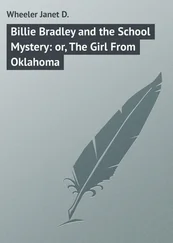When he brought it up, Kelleher smiled and said, “Are you in this to cover sports or to hang out with Susan Carol?”
“Both,” Stevie answered.
Mearns laughed. “You have to respect an honest man,” she said.
Susan Carol said nothing. But the smile on her face told him he had answered Kelleher’s question correctly.
The next few days dragged for Stevie. School was, quite simply, something he knew he had to do. The only subject that really excited him was history, and this week was more about English, math, and Spanish.
But on Friday he got out of school early so he and Kelleher could drive up to West Point. The Army team would be getting ready to leave campus to spend the night before the game in a hotel.
Kelleher, as usual, had done some advance planning. “They’ve started a tradition under Coach Ellerson of seeing the team off whenever they leave the Post,” Kelleher said. “We’ll be there in time for that. And Cantelupe and Noto will meet us. We’ll eat dinner in the mess hall so you can get a feel for how the cadets live, and then we’ll have to be up early for the game in the morning.”
Stevie could fill in most of the blanks Kelleher had left in his explanation: Rich Ellerson was Army’s coach. It was only his second year there, but he had completely turned around a program that had endured twelve straight losing seasons. Jim Cantelupe and Anthony Noto were former Army football players Kelleher had come to know through the years. Cantelupe was some kind of investment banker who lived in Chicago. Noto was the chief financial officer for the NFL. The one thing Stevie didn’t understand was Kelleher’s reference to “the Post.”
Kelleher laughed. “Sorry, it’s an Army thing,” he said. “The college is on an Army post. A lot more people live and work there than the four thousand cadets. So they call it the Post. At Navy, which is a lot smaller, the campus is called the Yard. There’s a lot of Army-Navy lingo-you’ll pick it up.”
The drive north was pretty, and fortunately traffic was relatively light. By late afternoon, Stevie spotted a sign that said WEST POINT-2 MILES.
They had to go through two security checkpoints to enter the Post.
“That big building on our right is the Thayer Hotel, which is where we’re staying tonight,” Kelleher said as they drove up to the second checkpoint. “It’s named for Sylvanus Thayer, who founded the academy.”
They drove up a hill and Stevie was amazed by the beauty of the place. It was a crisp fall day and the trees were all decked out in reds and golds. Stevie could see the football stadium and water beyond that.
“That’s the reservoir,” Kelleher said. “Beyond that is the Hudson River. We’ll take a tour tomorrow morning and you’ll be able to see it all. It’s pretty spectacular.”
They took a right turn beyond the stadium, wound around, and Kelleher pulled into a parking lot. “It’s not a long walk from here,” he said. “We’ve got a few minutes since we didn’t hit much traffic.”
They walked through the parking lot and across a street and came to a massive open area. “They call this the Plain,” Kelleher said. “It’s the central part of the campus. Those bleachers across the way are set up for the parade tomorrow morning.” He pointed at a statue. “Sylvanus Thayer,” he said.
“Guess he’s kind of a star around here,” Stevie said.
Kelleher laughed. “I’d say so. But there are lots of statues. In fact, the place we’re going has a giant statue of George Washington and we’ll also walk past one of Douglas MacArthur.”
Stevie’s phone was buzzing in his pocket. He looked at the number and answered: it was Susan Carol.
“Where are you?” she asked.
“Walking by a bunch of generals,” Stevie said. “How about you?”
“We’re on our way to have dinner with the Navy team at the hotel,” she said. “We were just at the stadium when the team did their walk-through. What an amazing place it is. Touchdown Jesus is even cooler in person than on TV. Pat Haden was really nice, and so was Tom Hammond, the announcers, you know, from NBC? I guess Tom and Tamara are old friends.”
Her words were coming in a rush, her southern accent in full flight.
“Where are you staying?” he said when she paused for breath.
“Oh! That’s a funny story too,” she said. “We’re staying with the team in a place over the Indiana-Michigan state line in a town called Michiana.”
“Michigan?”
“Yeah. All the hotels around here require a two-night stay on football weekends-even for the visiting teams. Then they charge like four hundred dollars a night. So the visiting teams stay about forty-five minutes away, over the state line.”
“That’s crazy,” Stevie said.
“Well, when you’re Notre Dame, I guess you can get away with it,” she said. “Tamara told me the place where y’all are stayin’ is great.”
“Haven’t been there yet. I’ll let you know. But the Post is pretty impressive.”
“Oh, gotta go. We’re pullin’ in to the hotel.”
“Do I hear a siren?”
“Yes-they let us follow the Navy buses, so there’s a police escort with us. Talk soon.”
He snapped the phone shut, shaking his head.
“Sounds like she’s having fun,” Kelleher said, smiling.
“She always has fun. Does anyone ever say no to Tamara or to her?”
“Nope,” Kelleher said. “And that includes you and me.”
* * *
Anthony Noto and Jim Cantelupe looked like the ex-football players they were. Neither was that big, but both had broad shoulders and seemed like they were still in playing shape to Stevie, even though Noto was class of ’91, Cantelupe class of ’96.
The two Army grads walked Kelleher and Stevie over to a spot not far from the statue of George Washington. As they got there, the giant doors of the building just beyond the statue opened and cadets began pouring out of them, most of them screaming and waving their arms. For a second, Stevie thought they had walked into the middle of a full-scale riot.
“They assemble inside the mess hall, then race out here to get into formation just before the team arrives,” Noto explained. “It used to be we only did stuff like this the week of the Navy game. But Coach Ellerson wants to send the message that every game’s a big game and that the corps needs to be behind the team every week. So he started this send-off when he got here.”
“Actually, I think they’ve done something like this for years,” Cantelupe said. “At least for road games.”
While they were talking, most of the cadets were organizing themselves into rows; each of them seemed to know exactly where to stand. One group had broken off and had formed an alley of sorts that led to a walkway between the two buildings.
“Plebes,” Noto said, and seeing Stevie’s expression added, “Freshmen. They form the cordon the players will walk through. Then the team assembles over here. And the buses are waiting for them over there.”
At that moment a loud cheer went up and Stevie saw what had to be the football team, even though they were dressed in neat gray uniforms like everyone else. The plebes were going crazy cheering. The upperclassmen were joining in, though not quite as enthusiastically as the first-year cadets.
Once everyone had walked through the cordon, the players assembled in front of the statue. Coach Rich Ellerson stepped to a microphone.
“We aren’t going to take long,” he said, “but I want you all to know how much it means to us to see you assembled out here.”
“As if they had any choice,” Kelleher whispered.
“I think at Navy they call it ‘mandatory fun,’ ” Cantelupe said.
Читать дальше












